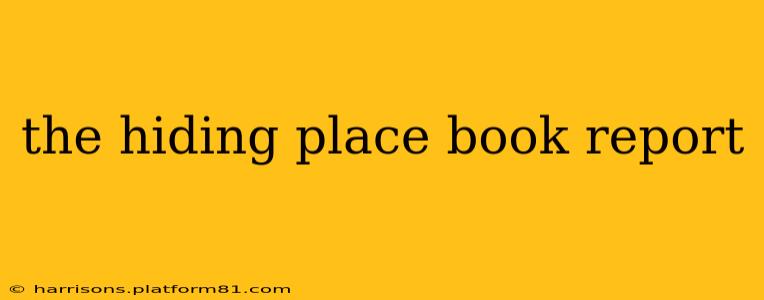Corrie ten Boom's The Hiding Place is more than just a memoir; it's a testament to the enduring power of faith in the face of unimaginable suffering. This book report delves into the compelling narrative, highlighting key themes, character development, and the lasting impact of this extraordinary story.
A Family's Secret and the Shadow of War
The story unfolds in Haarlem, Netherlands, before the Second World War, introducing us to the ten Boom family and their deeply rooted Christian faith. Their home becomes a haven, secretly sheltering Jewish people from the Nazi regime's brutal persecution. This act of defiance, born from compassion and religious conviction, forms the central conflict of the narrative. We see the gradual escalation of Nazi control, the increasing risks involved in hiding Jews, and the ten Boom family's unwavering commitment to their beliefs, despite the ever-present danger.
What is the main conflict in The Hiding Place?
The primary conflict is the external struggle against the Nazi regime and the internal struggle to maintain faith and hope amidst unimaginable suffering. Corrie and her family face the constant threat of discovery and death, forcing them to grapple with the moral implications of their actions and the profound spiritual challenges presented by their circumstances. This conflict is not just physical; it's a battle of ideologies, a fight between good and evil, and a testament to the human spirit's resilience.
Characters and Their Transformations
The Hiding Place is populated with richly drawn characters. Corrie ten Boom herself is portrayed as a woman of unwavering faith, practical resourcefulness, and deep empathy. Her father, Casper ten Boom, is depicted as a wise and compassionate patriarch, deeply committed to serving others. The supporting characters, both Jewish refugees and fellow resisters, add depth and complexity to the narrative, each contributing to the overall message of hope and resilience. The book powerfully illustrates how even in the darkest of times, human connection and compassion can offer solace and strength.
What are the main themes of The Hiding Place?
Key themes include faith, forgiveness, the power of human resilience, and the importance of resisting injustice. The book explores the complexities of faith, showing how it can be tested and strengthened through adversity. It also highlights the human capacity for both cruelty and compassion, illustrating the importance of choosing kindness and standing up for what is right, even when it's perilous. The constant presence of faith is a strong theme, providing hope and strength to Corrie and those she helps to hide.
The Ravensbrück Concentration Camp and Beyond
The arrest of the ten Boom family and their subsequent imprisonment in Ravensbrück concentration camp form a pivotal part of the narrative. Corrie's experiences within the camp vividly depict the horrific conditions, the dehumanization of prisoners, and the constant threat of death. However, even amidst this unspeakable suffering, the unwavering faith of Corrie and others shines through, offering a powerful message of hope and the indomitable spirit of humanity. The book does not shy away from the brutality of the camp, but it focuses on the strength and resilience found within the human spirit.
How does Corrie ten Boom's faith impact the narrative?
Corrie's faith acts as a constant source of strength and guidance throughout the narrative. It fuels her compassion, courage, and unwavering determination to help those in need. Her faith is not merely a belief system; it is a tangible force that shapes her actions, decisions, and ultimately, her survival and post-war reconciliation.
Legacy and Lasting Impact
The Hiding Place remains a powerful and moving testament to the human spirit's capacity for resilience, compassion, and forgiveness. It's a story that transcends its historical context, offering lessons in faith, courage, and the importance of standing up against injustice. The book's enduring popularity underscores the continued relevance of its message in a world still grappling with issues of persecution, prejudice, and the search for meaning and purpose in the face of suffering. It’s a book that stays with you long after you finish reading it, prompting reflection on the choices we make and the values we hold dear.
